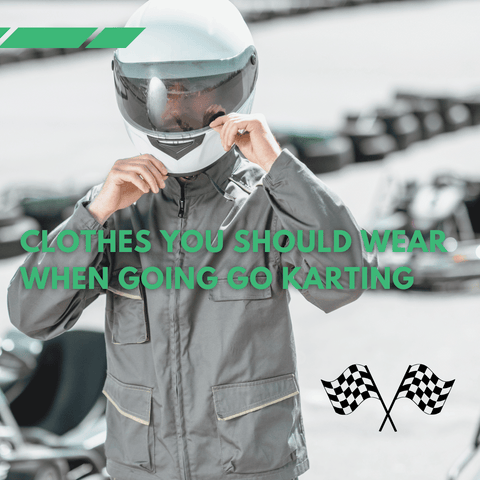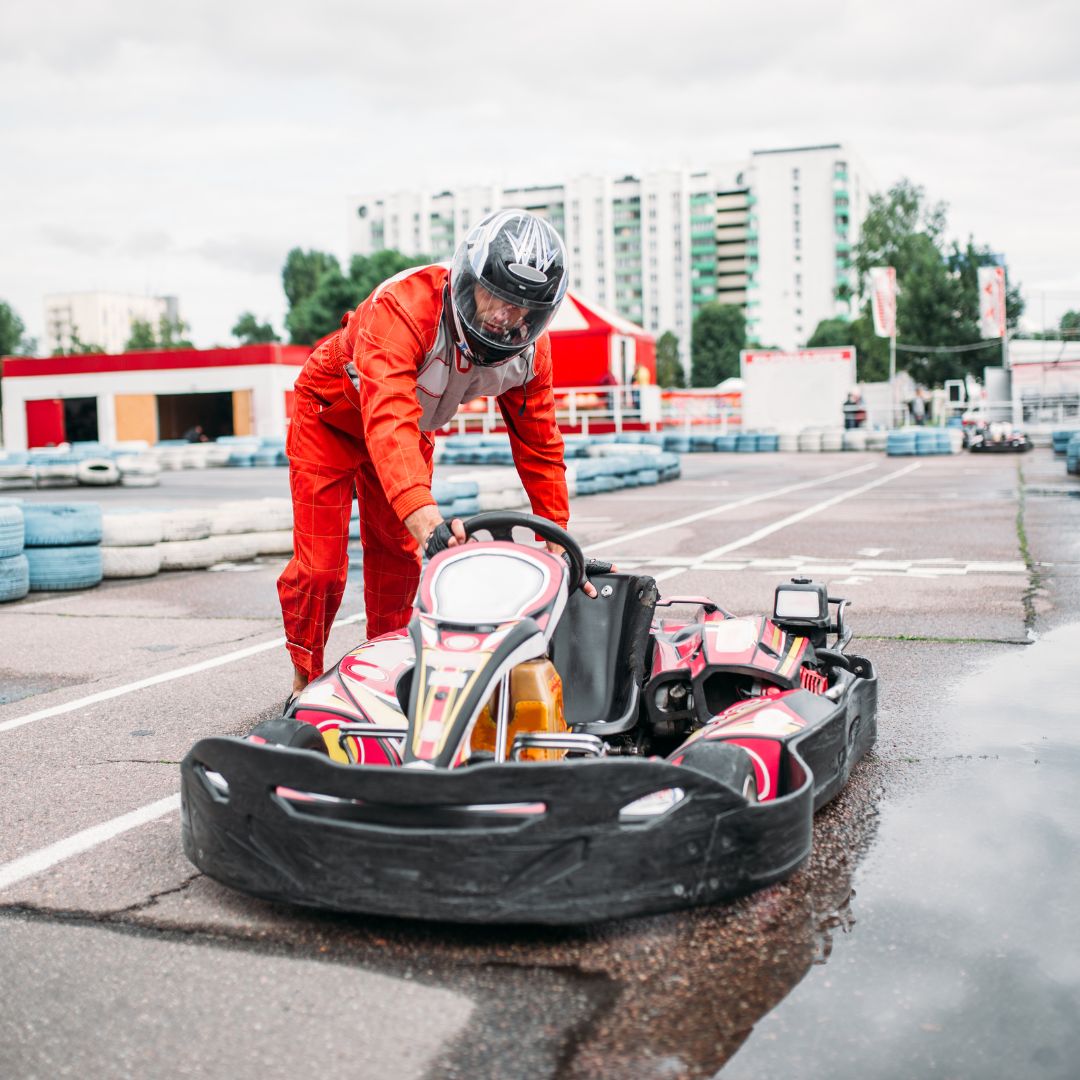
Updated: 23.05.25
Go-karting is fast, furious, and incredibly fun. Whether you're 8 or 80, zipping around a track feels like being a Formula1 driver, even if just for a few laps. But with great speed comes great responsibility—go-karting safety is key.
Let’s explore essential go-kart safety measures to make your race thrilling and secure.
1. Pre-Ride Preparations
Before hitting the accelerator, ensure you're fully prepared for a safe ride.
Proper Safety Gear: Your Go-Kart Protective Gear
Your go-kart safety equipment is your first line of defense on the track. High-quality gear, from helmets to gloves, ensures protection and control. Here’s what you need:
| Safety Gear | Description |
|---|---|
| Karting Helmets | Full-face helmets, like Bell or Arai, meet DOT or Snell standards for impact protection. |
| Karting Suits | Lightweight, abrasion-resistant suits, like OMP KS-3, use fire-retardant materials for comfort and safety. |
| Karting Shoes | Slip-resistant soles, like OMP KS-2 or Sparco boots, enhance pedal precision. |
| Rib Protectors | Shields chest and ribs from impacts, e.g., Alpinestars or Ribtect protectors. |
| Racing Gloves | Nomex gloves from Sparco or Oakley ensure grip and protect against burns. |
Karting helmets are critical, offering impact protection with brands like Bell.  Karting suits, like the OMP KS-3, balance comfort and abrasion resistance. Karting shoes, such as OMP KS-2 or Sparco boots, improve pedal precision. Rib protectors and racing gloves complete your armor, ensuring safety and control.
Karting suits, like the OMP KS-3, balance comfort and abrasion resistance. Karting shoes, such as OMP KS-2 or Sparco boots, improve pedal precision. Rib protectors and racing gloves complete your armor, ensuring safety and control.
Age and Size Restrictions: Finding the Right Kart
Choosing a kart suited to your size and skill level is vital for safe go-karting. Tracks like Atlanta Motorsport Park (minimum 12 years, 58 inches) and YAS Marina Circuit (minimum 5 years) set age and height restrictions. K1 Speed focuses on height-based restrictions for a safe, competitive fit.
| Track | Age Restriction | Height Restriction |
|---|---|---|
| Atlanta Motorsport Park | Minimum 12 years | 58 inches |
| YAS Marina Circuit | Minimum 5 years | No specific height |
| K1 Speed | No age limit | Height-based restrictions |
Health Considerations: Racing with Care
Your health impacts your racing experience. Discuss pre-existing conditions with track staff to ensure a safe, enjoyable ride. Avoid karting if you have conditions like epilepsy, heart issues, or pregnancy, as outlined below.
| Condition | Reasons to Avoid |
|---|---|
| Epilepsy or Seizure Disorders | High speeds and stimulation may trigger seizures, risking accidents. |
| Heart Conditions | Adrenaline and exertion may strain the heart, risking cardiac events. |
| Back or Spinal Injuries | Jarring motions can worsen spinal issues. |
| Pregnancy | Jostling and collisions pose risks to mother and child. |
| Impairing Illness or Injury | Conditions affecting physical or cognitive abilities compromise safety. |
2. Understanding Risks and Dangers of Go-Karting
Is go-karting dangerous? While thrilling, go-karting carries risks like collisions or loss of control, especially if safety measures are ignored. Proper gear, adherence to go-karting rules, and track awareness minimise these dangers, making it a safe activity for most.
3. On-Track Safety
Once geared up, focus on staying safe with proper training and adherence to go-karting rules and regulations.
Training and Supervision
- Pre-Race Briefings: Learn kart handling, track layout, and safety rules during mandatory briefings.
- Hands-On Training: Practice braking and steering in a controlled setting with professional guidance.
- Adult Supervision for Kids: Ensures young racers stay safe and follow rules.
Track Rules and Regulations
Every track has strict go-kart rules to keep racers safe. Common rules include:
- Speed Limits: Set based on track layout and kart capabilities to ensure safety.
- Passing Guidelines: Use designated zones (e.g., straightaways) and avoid contact during overtaking.
- Signaling: Use hand signals (e.g., raised hand for slowing) to communicate intentions and avoid collisions.
Behavioral Expectations
Good sportsmanship enhances safety. Follow these principles:
- Respect Others: Treat all drivers with respect, regardless of skill level.
- Follow Rules: Adhere to track rules to maintain a safe environment.
- Stay Calm: Keep emotions in check to avoid risky decisions.
4. Maintenance and Risk Management
Ensure your kart and awareness are race-ready to minimise risks.
Regular Maintenance Checks
- Pre-Ride Inspection: Check for loose bolts, frayed cables, or worn tires.
- Service History: Ask staff about the kart’s maintenance record.
- Brakes and Steering: Ensure responsive brakes and smooth steering.
- Safety Equipment: Verify seat belts and padding are secure.
Safest Karting Barriers
Modern tracks use advanced barriers like soft foam or plastic systems (e.g., Protex barriers) to absorb impacts and reduce injury risk. Check that your track uses certified barriers and regularly inspects them for wear.
Risk Awareness
- Track Layout: Study turns and features to navigate safely.
- Common Hazards: Watch for slippery spots or accident-prone areas.
- Track Conditions: Adjust driving for weather or wear-related changes.
Emergency Procedures
- Know Protocols: Understand flags (e.g., red for stop), lights, or alarms signaling race halts.
- Locate Assistance: Know where to find staff or medical help.
- Basic First Aid: Be prepared to handle minor injuries until help arrives.
5. Encouraging Parental Involvement
Parents play a crucial role in ensuring a safe go-karting experience for kids. Engage with your child about safety, understand risks, and lead by example to foster a safety-first mindset.
Conclusion
Go-karting is an exhilarating activity when paired with proper go-kart safety measures. By preparing thoroughly, following track rules, and maintaining your kart, you’ll enjoy a thrilling and safe race. Explore our kids’ ride-on go-karts for safe, fun adventures!
Frequently Asked Questions
Is go-karting safe for kids?
Go-karting is safe for kids with proper safety gear, age-appropriate karts, and supervision. Tracks with strict safety standards ensure a secure experience.
How can I ensure a go-kart facility is safe for my child?
Choose facilities with strict safety standards, protective gear requirements, safety briefings, and well-maintained karts. Check reviews or visit the track to confirm safety practices.
Can adults and kids race together safely?
Some tracks allow family sessions with varied karts and strict supervision, while others separate by age or size. Confirm with the facility for their policies.
Is it necessary to know driving for go-karting?
No driving experience is needed for go-karting. Tracks provide briefings and hands-on training to teach kart handling, making it accessible for beginners.
What safety gear is essential for go-karting?
Essential go-kart protective gear includes a full-face helmet, karting suit, slip-resistant shoes, rib protectors, and racing gloves to ensure safety and control.
Get in Touch 🚀
Loved our guide on go-kart safety measures? Ready for more exciting tips?
Whether you're a parent or grandparent, we’re here to answer your kids’ ride-on toy questions! 🚗💨
Visit our wonderland at RiiRoo.com or try our Live Chat to talk toys!







Share:
Understanding the Different Types of Go-Kart Racing for Kids
How to Choose the Right Go-Kart for Your Skill Level